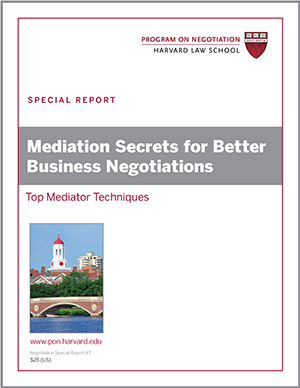
Faster, cheaper, and less risky than a court trial, mediated communication can empower parties to try to overcome their differences. But as a mediated communication example involving the National Football League (NFL) and its former players over liability for head injuries illustrates, mediation needs to be conducted carefully, or it can create even greater harm.
A Promising Resolution
In August 2013, the National Football League (NFL) agreed to pay $765 million to settle a lawsuit filed by more than 4,500 former players and their families, who accused the league of covering up knowledge of the dangers of head injuries incurred by players on the field.
The deal, reached through court-sponsored mediation, was favorable to the NFL, which faced damaging disclosures and billions in liability payments, according to the New York Times. To avoid a lengthy and risky trial, plaintiffs’ lawyers sought to quickly secure care for clients facing severe neurological problems.
About 20,000 retired players were covered in the settlement. Those diagnosed with dementia and conditions such as Parkinson’s disease and amyotrophic lateral sclerosis (ALS), or the families of deceased players with such diagnoses, would be eligible for payouts. Notably, the settlement wouldn’t cover players who died after April 22, 2015. Money was also set aside to fund medical exams for players who suspected they were suffering the effects of brain trauma.
Broken Promises
In the years following the settlement, hundreds of players and their families faced continual roadblocks from the NFL, which refused to pay out about three-quarters of claims for dementia.
The league also often failed to disburse promised payouts or redirected them to insurance companies, lawyers, and others that placed a lien on the awards, according to USA Today. One widow of a player with Alzheimer’s was promised $160,000—only to receive a bill from the NFL for $740 after deductions and “holdbacks” for possible future medical bills incurred by her deceased spouse.
“These players didn’t know what they were getting into,” Craig Mitnick, a lawyer whose firm represents more than 1,000 players in the class action. “The settlement is not what we thought it was.”
Separate and Unequal
In August 2020, retired NFL players Najeh Davenport and Kevin Henry accused the NFL in court of discriminating against hundreds, perhaps thousands, of Black players who filed dementia-related claims in the concussion settlement.
Under the settlement terms, doctors are given a confidential manual that they can use to test ex-players’ cognitive abilities. The so-called Heaton Norms include benchmark average scores on cognitive and memory tests that are meant to factor in differences based on race, ethnicity, age, education, gender, and other variables. The benchmarks are lower for Black people than for Whites. But because the norms were not adjusted for the largely college-educated pool of former players, “Black players have to show steeper cognitive declines [than Whites] to qualify for a payout,” according to the Times.
Doctors aren’t required to factor in race in their test results. But when some Black players scored at a level that would qualify them for financial awards, the NFL appealed the results to the concussion settlement administrator, saying race needed to be applied as a factor. Boston University School of Medicine neurology professor Robert Stern told the Times that the practice is “inappropriate and results in injustice and racial inequities.”
Davenport and Henry asked the judge overseeing the settlement to replace the norms with race-neutral scales. “If a racial factor is being used against a historically disadvantaged group to deny benefits that they would otherwise receive, that is illegal,” University of St. Thomas School of Law in Minneapolis professor Thomas Berg told the Times.
When One Mediation Leads to Another
In March 2021, the federal judge overseeing the settlement, Anita B. Brody, dismissed Davenport and Henry’s lawsuit but expressed concern about the race-based benchmarks. She appointed a magistrate judge to mediate a resolution between the NFL and Christopher Seeger, the lawyer representing all players covered by the settlement.
Seeger said in a statement that he had seen no evidence of racial bias in the settlement program but agreed the race-based norms should be scrapped and said Black players denied payouts should have their tests rescored. Lawyers for Henry and Davenport, as well as a group of wives of former players, said they were skeptical that Seeger would push the NFL to abandon the racial norms, since he’d agreed to them in the original settlement. Players who had been wronged should have a seat at the table, they said.
Davenport sustained at least 10 concussions while playing for the NFL, one of which required surgery. His memory loss and depression required him to stop working as a teacher. “You give this game so much,” he told the Times. “Just to think that they would do that just to save a few dollars, it’s disheartening.”
Head Off Mediated Communication Issues
The troubled concussion settlement shows that the mediation process is not a cure-all. To make sure you’re not taken advantage of in mediation, follow these guidelines:
- Don’t let them rush you. As you aim for an expeditious resolution, beware the risks of being hurried into an unfair settlement. Think through the long-term implications of proposed deals before saying yes.
- Don’t let the fox guard the henhouse. The more powerful party in a dispute shouldn’t be in charge of adjudicating future claims. Insist on appointing a neutral party whom both sides trust to administer funds and make key decisions.
- Don’t let others speak for you. Never agree to a settlement that would leave you voiceless in decisions that affect you. Insist on a seat at the table.
Have you encountered any difficulties in mediated communication?





